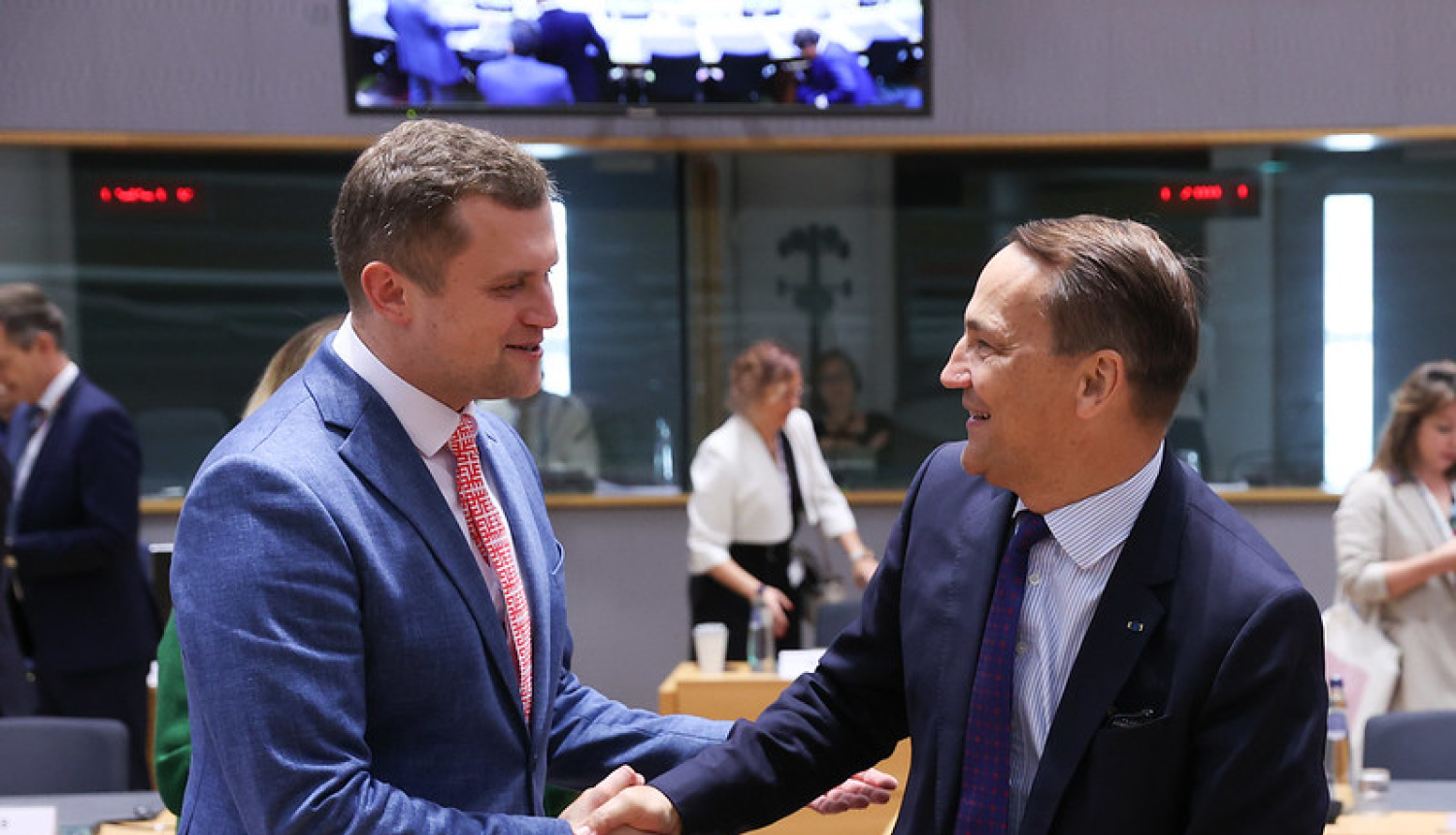On 15 July 2025 in Brussels, Belgium, the Parliamentary Secretary of the Ministry of Foreign Affairs, Artjoms Uršuļskis, took part in a meeting of the European Union (EU) Foreign Affairs Council.
Ukraine. Members of the EU Foreign Affairs Council discussed an increase in joint military support by the EU and its Member States to Ukraine.
Artjoms Uršuļskis: “Our top priority remains an increase in military support to Ukraine both at the EU level and on a bilateral basis. Today, the Prime Minister of Latvia is visiting Kiev to demonstrate Latvia’s unwavering solidarity with Ukraine and announce the delivery of 42 Patria armoured vehicles. The first of those will be delivered to Ukraine in the near future.”
EU Member States are implementing an initiative to deliver 2 million rounds of large-calibre ammunition to Ukraine in 2025. 80% of the target has already been achieved. Latvia has committed to providing military support to Ukraine in the amount of at least 0.25% of GDP both this year and in 2026. Latvia also supports Ukraine’s military industry, especially drone production. Latvia, together with the United Kingdom, leads the Drone Coalition established in 2024, which comprises 20 participating countries already. Latvia allocated 20 million euros for the Drone Coalition in 2024 and delivering almost 5,000 drones to Ukraine. In 2025, Latvia will further invest in Ukraine’s military drone industry, finance the Drone Coalition and train up to 4,000 Ukrainian military personnel.
The Ukrainian Minister of Foreign Affairs, Andrii Sybiha, joined the Foreign Affairs Council via videoconference and pointed out that Russia must be made aware that its war of aggression is doomed to failure. Minister Sybiha called for support to Ukrainian military industry and for including Ukraine in the EU’s investment plans. “We cannot wait for peace to set in, we must win the war so that there would be peace,” the Ukrainian Foreign Minister underlined.
Sanctions. The Council discussed the approval of the 18th round of sanctions against Russia, which include targeted sectoral restrictive measures against Russia’s energy sector, the lowering of the oil price cap, further sanctions against shadow fleet vessels, as well as the financial sector and Russian banks. Further alignment of sanctions against Russia and Belarus is also envisaged, especially in the area of trade restrictions. An exchange of views was also held on the next round, which should include even tougher restrictive measures against Russia.
“The 18th package of sanctions against Russia must be approved immediately to further constrain Russia, in particular, its energy and financial sectors, as well as to prevent the circumvention of sanctions. Work on an even stricter 19th round of sanctions should also begin to more actively target Russia’s supporters,” Artjoms Uršuļskis said. He went on to inform those present that “Latvia is suspending the acceptance of applications for, and issuance of new visas and first-time residence permits to Russian citizens who do not hold a Russian citizen’s biometric passport, thereby restricting the movement of Russian citizens in the Schengen area”.
“Latvia welcomes the European Commission’s REPowerEU plan to phase out Russian fossil fuel imports, and calls for further restrictions and tariff increases on imports from Russia and Belarus. Our priority is to eliminate imports of potassium chloride fertilisers from Russia,” Artjoms Uršuļskis underlined.
The Council approved new sanctions against natural and legal persons for actions that aggravate the human rights situation in Russia and for Russian hybrid activities that destabilise the situation in the EU and globally.
Situation in the Middle East. The Foreign Affairs Council discussed the humanitarian situation in Gaza, sanctions against Hamas and violent settlers, the situation in Iran and possible support for the International Atomic Energy Agency. The Council approved a decision on additional listings under in the EU’s Global Human Rights Sanctions regime of persons belonging to criminal networks in relation to Iran's human rights violations and threats posed in EU Member States.
Latvia believes that the continuation of the EU-Israel dialogue serves as a platform for maintaining contacts with Israel, including on issues where our views differ. The humanitarian situation in Gaza is deteriorating, therefore it is vital to take action without further delay – to resume ceasefire, to provide humanitarian aid on a large scale and to release all hostages immediately,” Artjoms Uršuļskis said.
Georgia. The Foreign Affairs Council discussed possible further action by EU institutions and Member States in relation to democratic backsliding in Georgia and an escalation in domestic political tension. Foreign Ministers exchanged views on the imposition of EU-level sanctions against Georgian officials responsible for human rights violations, including excessive violence against peaceful protesters and independent media in the context of increasing repression. EU funding for civil society has significantly increased over the past year. The Commission plans to announce additional support. Artjoms Uršuļskis informed the Council that “the Latvian Foreign Minister Baiba Braže has taken a decision to put another 55 Georgian citizens on the list of personae non grata in the Republic of Latvia pursuant to Section 61.2 of the Immigration Law”.
The Members of the Foreign Affairs Council also met with the Minister of Foreign Affairs of Moldova, Mihai Popșoi, for an exchange on the outcomes of the EU-Moldova summit and on the upcoming parliamentary elections in Moldova. The Council approved further listings under the sanction regime for destabilising actions against the Republic of Moldova.
The Foreign Affairs Council also exchanged views on opportunities for strengthening the EU’s cooperation with the Southern Neighbourhood region, the EU-Latin America and Caribbean dialogue, as well as preparations for the EU-Japan Summit and the EU-China Summit.
Sanctions against Iran in the field of human rights (a press release)




